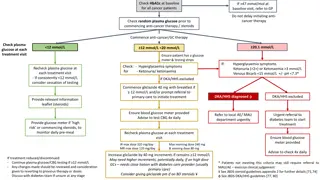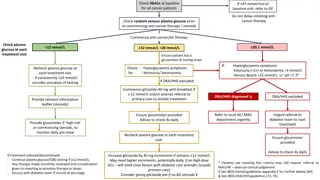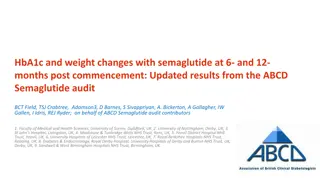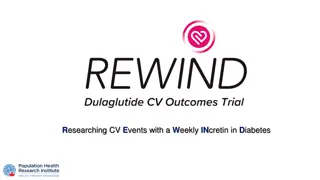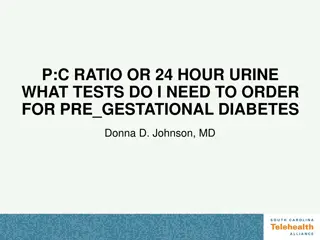Case Study: Managing High HbA1c and Normal Fasting Glucose Levels
A case study discusses a 69-year-old woman with a history of stable diabetes facing elevated HbA1c levels despite normal fasting glucose. Initial investigations, including a day curve test, reveal high postprandial glucose levels. The analysis leads to identifying iron deficiency anemia, prompting f
9 views • 22 slides
Guidelines for Monitoring Blood Glucose in Cancer Patients Undergoing Anti-Cancer Therapy
Guidelines recommend checking HbA1c and random plasma glucose levels at baseline for all cancer patients before initiating anti-cancer therapy. Regular monitoring of plasma glucose levels during treatment is essential, with specific actions based on glucose readings. Immediate referrals and treatmen
0 views • 4 slides
Guidelines for Managing Hyperglycemia in Cancer Patients Receiving Anti-Cancer Therapy
Cancer patients undergoing anti-cancer therapy need vigilant monitoring for hyperglycemia. Baseline HbA1c and random plasma glucose levels must be checked before initiating therapy. Regular glucose monitoring, symptom assessment, and ketone testing are crucial throughout treatment. Prompt referrals,
0 views • 4 slides
Priorities and Quality Measures for Type 2 Diabetes Care in NHS GGC
Dr. Kashif Ali leads primary care for Type 2 diabetes, while Dr. James Boyle oversees secondary care in NHS GGC. The data from December 2018 shows the number of Type 2 diabetes patients, their care processes, HbA1c levels, and BMI status. The Diabetes Quality Improvement and Outcome Measures aim to
0 views • 27 slides
Diabetes Collaborative Project 2015-2016 Summary
In the Diabetes Collaborative Project 2015-2016, a random sample of 75 diabetic patients' records were queried monthly at each clinic site, with a total sample size of 450 patients reviewed monthly. Outreach activities were conducted based on sample data results. Metric goal variations were observed
0 views • 7 slides
Semaglutide Audit: HbA1c and Weight Changes at 6- and 12-Months Post Commencement
Updated results from the ABCD Semaglutide audit show significant weight reductions at 6 months in GLP1RA-naive individuals, with no significant change at 12 months. Similarly, HbA1c reductions were greater at 6 months for GLP1RA-naive individuals compared to switch individuals, showing significant i
0 views • 9 slides
Investigating the Impact of Weekly Incretin on Cardiovascular Events in Diabetes
Individuals with type 2 diabetes have an increased risk of cardiovascular events compared to those without the condition. Research indicates that certain GLP-1 receptor agonists have shown promising results in reducing cardiovascular events in diabetic patients with specific HbA1c levels. However, t
0 views • 69 slides
Comprehensive Testing Recommendations for Pre-Gestational Diabetes Management by Dr. Donna D. Johnson, MD
Routine prenatal labs, including screening for asymptomatic bacteriuria, hemoglobin A1C, basic tests like BMP and TSH, and frequency of tests such as HbA1C, home glucose monitoring, urine ketones, and serum creatinine are crucial for managing pre-gestational diabetes. Additional assessments like dil
0 views • 7 slides

